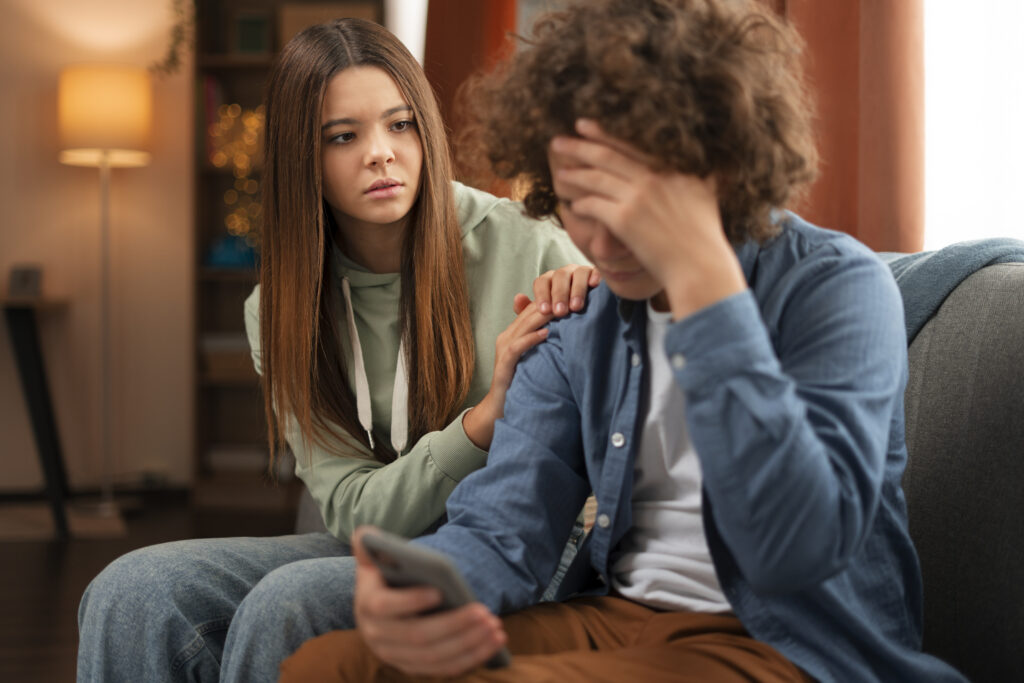Bullying has long been acknowledged as a serious problem in our society that can have serious consequences for those involved. Unfortunately, the mental health impact of bullying on students is often overlooked or disregarded. From children impacted by bullying to their parents and teachers, everyone should be aware of the negative effects it can have on someone’s mental well-being – both in the short and long term. In this blog post, we will discuss some of these impacts which range from low self-esteem to depression and anxiety – even suicide– so that everyone understands just how damaging bullying can truly be.
Understanding Bullying and its Causes
Bullying is a serious problem that causes lasting harm to the victims and bystanders who witness it. It encompasses a wide range of behaviors, including physical, verbal, cyberbullying, exclusion, and more and can have an immensely negative impact on mental and physical health. Unfortunately, there appears to be no single cause of bullying. In fact, research shows that there are many interrelated factors that contribute to the occurrence of this destructive behavior. For example, some individuals may bully due to their own experiences with rejection or bullying in the past, while others may resort to this type of behavior in order to boost their self-esteem or gain attention for themselves in a negative way. Additionally, social disconnection from family or peers often plays a role in the development of bullying behavior. If we are all working together collectively to understand and identify the underlying causes of bullying—and taking actionable steps towards eliminating it—we can make real progress toward providing a safe learning environment for everyone.
How Bullying Affects Mental Health
Bullying can have a detrimental effect on mental health, particularly when it occurs at a young age. Research has found that bullying in childhood is linked to an increased risk of experiencing depression and anxiety in adulthood. It can also lead to low self-esteem, which can prevent those affected from engaging in positive activities or relationships later in life. It is important to take action against bullying so that its damaging effects can be prevented or minimized. We must all work together to ensure that individuals, especially young people, do not suffer the serious consequences of this potentially harmful behavior.
The Long-Term Effects of Bullying on Mental Health
Bullying is a serious issue that can severely damage an individual’s mental health both in the short and long-term. Further research indicates that, even after years, victims of bullying still suffer from mental health issues such as depression, post-traumatic stress disorder, low self-esteem and loneliness. In many cases, the effects of bullying can last for decades – making it difficult to develop meaningful relations with other people or feel secure within their own lives. To ensure that adults are better equipped to cope with bullying, it is important for children and teenagers to receive proper guidance on how to recognize the signs of bullying and report it when they encounter it. By doing this, we can help struggling individuals build stronger mental health going forward.

Warning Signs of Bullying in Children and Adults
Bullying is a form of abuse that can have serious, long-term effects on both children and adults. It is important to be aware of potential warning signs so the behavior can be addressed in a timely manner. Some common signs include avoiding school or other activities, difficulty sleeping, physical signs of distress such as unexplained injuries or fatigue, acting out in an exaggerated way, lacking self-confidence or having low self-esteem, being unusually sad or withdrawn, expressing feelings of powerlessness, and demonstrating aggression towards other people or animals. Recognizing these warning signs as early as possible is critical for helping to prevent the potentially harmful consequences of bullying behavior.
Tips for Dealing with Negative Effects of Bullying
One of the most important things to do if you are dealing with the negative effects of being bullied is to take care of yourself. This means engaging in self-care, such as eating nutritious meals and getting enough restful sleep. It also means participating in positive activities that help to maintain or enhance your mental well-being, such as talking to a therapist or counselor, doing yoga and other physical exercise, gardening, or meditating. Building a social support network can be beneficial too; connecting with understanding peers who have gone through similar experiences can be very helpful. Finally, it’s important to remember that even though it may seem impossible now, there is hope for a more positive future.

How to Seek Help?
If you have been a victim of bullying and are now experiencing its consequences, such as depression, distrust in relationships, or physical violence, it is important to seek help. Reaching out to a trusted adult – such as a family doctor, teacher, or counselor – can provide a safe environment for expressing your feelings and exploring solutions. You may also want to consider joining an online community of similar-minded people who can provide support from the privacy and convenience of your own home. Additionally, many organizations exist dedicated to helping those affected by bullying take appropriate action. Working with one of these agencies can help build self-confidence and create positive relationships that can assist in overcoming the obstacles presented by bullying. Whatever course you take, remember that seeking help is essential for managing the difficult effects of bullying and beginning your journey toward recovery.
Last Word
Bullying is a serious issue that can cause lasting effects on the mental health of those involved. Whether you’re a victim, bully, or witness to bullying, it’s important to recognize the warning signs and take steps to protect yourself and reach out for help if needed. Thankfully, there are resources and strategies to address bullying and its consequences so that everyone receives the support they need. It’s up to all of us — educators, parents, peers —to create safe spaces where every student feels like they belong and are protected against bullying. It’s essential that we equip ourselves with the knowledge of how to recognize and handle this social problem effectively so that we can make sure no one experiences negative psychological effects as a result of bullying in the future.






